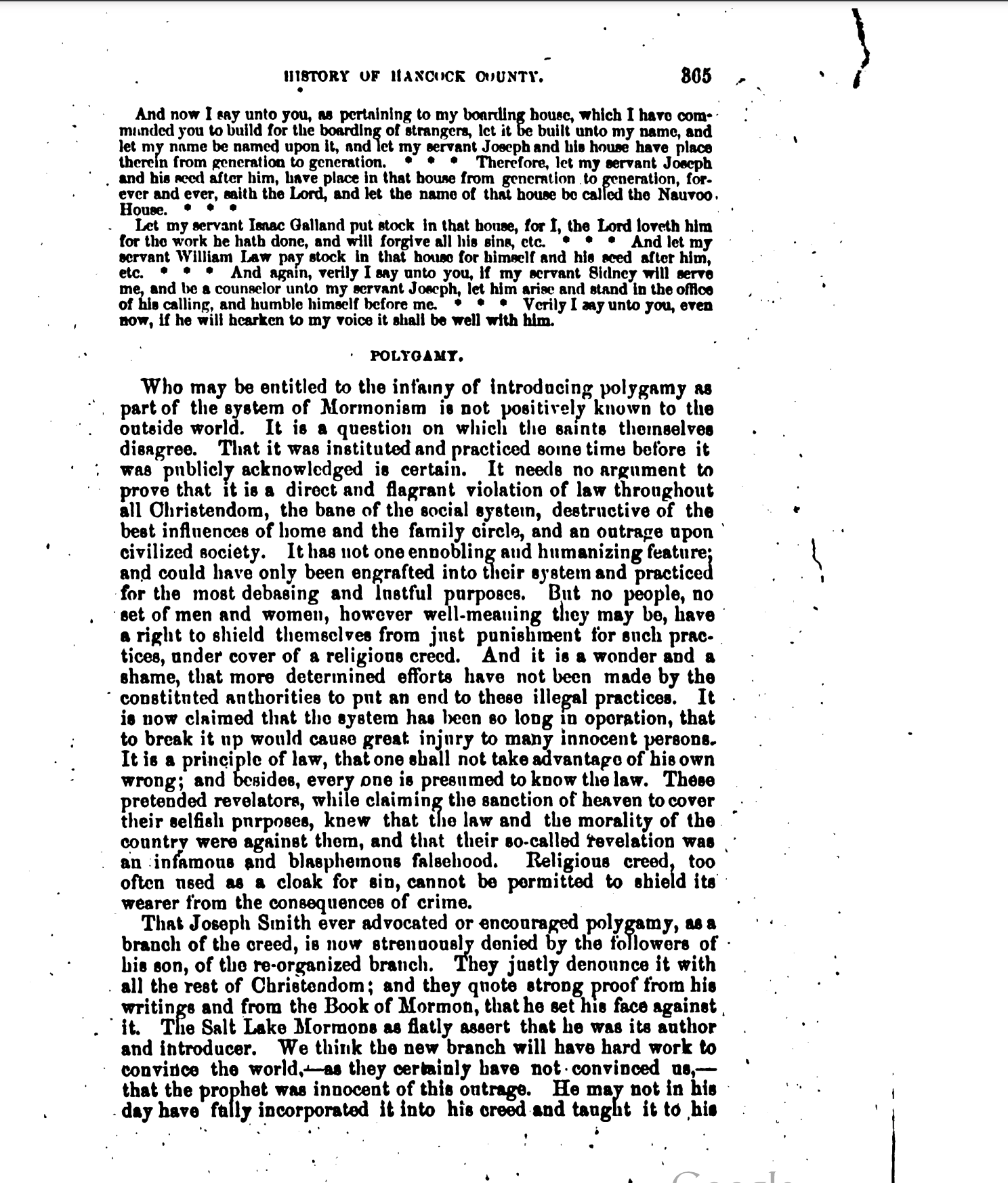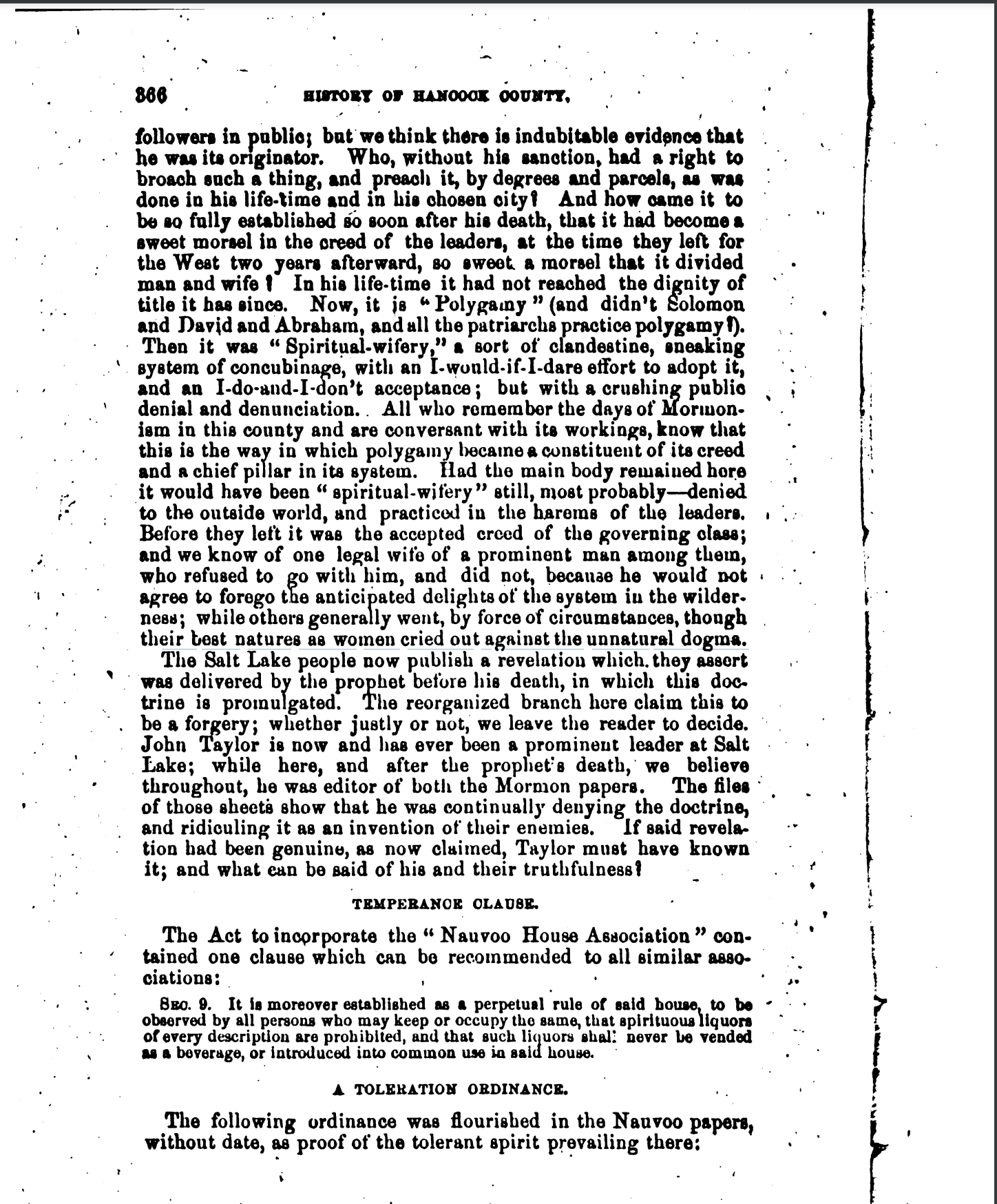Thomas Gregg criticizes practicing polygamy in "the system of Mormonism."
- Type
- Book
- Source
- Thomas Gregg CriticNon-LDS
- Hearsay
- Direct
- Reference
Thomas Gregg, History of Hancock County, Illinois: Together with an Outline History of the State, and a Digest of State Laws (Chicago, IL: C. C. Chapman, 1880), 365–366
- Scribe/Publisher
- C. C. Chapman
- Audience
- Reading Public
- Transcription
Polygamy.
Who may be entitled to the int'ainy of introducing polygamy as part of the system of Mormonism is not positively known to the outside world. It is a question on which the saints theinselves disagree. That it was instituted and practiced some time before it was publicly acknowledged is certain. It needs no argument to prove that it is a direct and flagrant violation of law throughout all Christendom, the bane of the social system, destructive of the best influences of home and the family circle, and an outrage upon civilized society. It has not one endobling and humanizing feature; and could have only been engrafted into their system and practiced for the most debasing and lustful purposes. But no people, no set of men and women, however well-meaning they may be, have a right to shield themselves from just punishment for such practices, under cover of a religious creed. And it is a wonder and a shame, that more determined efforts have not been made by the constituted anthorities to put an end to these illegal practices. It is now claimed that the system has been so long in oporation, that to break it up would cause great injury to many innocent persons. It is a principle of law, that one shall not take advantage of his own wrong; and besides, every one is presumed to know the law. These pretended revelators, while claiming the sanction of heaven to cover their selfish pnrposes, knew that the law and the morality of the country were against them , and that their so-called revelation was an infamous and blasphemous falsehood. Religious creed, too often used as a cloak for sin, cannot be permitted to shield its wearer from the consequences of crime.
That Joseph Smith ever advocated or encouraged polygamy, as a branch of the creed, is now strenuously denied by the followers of his son, of the re-organized branch. They justly denounce it with all the rest of Christendom; and they quote strong proof from his writings and from the Book of Mormon, that he set his face against it. The Salt Lake Mormons as flatly assert that he was its author and introducer. We think the new branch will have hard work to convince the world, as they certainly have not convinced us, that the prophet was innocent of this outrage. He may not in his day have fully incorporated it into his creed and taught it to his followers in public; but we think there is indubitable evidence that he was its originator. Who, without his sanction, had a right to broach such a thing, and preach it, by degrees and parcels, as was done in his life-time and in his chosen city! And how came it to be so fully established 80 soon after his death , that it had become a sweet morsel in the creed of the leaders, at the time they left for the West two years afterward, so sweet a morsel that it divided man and wife? In his life-time it had not reached the dignity of title it has since. Now, it is “Polygamy” (and didn't Solomon and David and Abraham, and all the patriarchs practice polygamy?). Then it was “Spiritual-wifery," a sort of clandestine, sneaking system of concubinage, with an I-would-if-I-dare effort to adopt it, and an I-do-and-I-don't acceptance; but with a crushing public denial and denunciation. All who remember the days of Mormonism in this county and are conversant with its workings, know that this is the way in which polygamy becaine a constituent ofits creed and a chief pillar in its system. Had themain body remained hore it would have been “spiritual-wifery" still, most probably denied to the outside world, and practiced in the harems of the leaders. Before they left it was the accepted creed of the governing class; and we know of one legal wito of a prominent man among them, who refused to go with him, and did not, because he would not agree to forego the anticipated delights of the system in the wilderness; while others generally went, by force of circumstances, though their best natures as women cried out against the unnatural dogma.
The Salt Lake people now publish a revelation which they assert was delivered by the prophet before his death, in which this doctrine is promulgated. The reorganized branch hore claim this to be a forgery; whether justly or not, we leave the reader to decide. John Taylor is now and has ever been a prominent leader at Salt Lake; while here, and after the prophet's death, we believe throughout, he was editor of both the Mormon papers. The files of those sheets show that he was continually denying the doctrine, and ridiculing it as an invention of their enemies. If said revelation had been genuine, as now claimed, Taylor must have known it; and what can be said of his and their truthfulness?
- Source Link
- https://www.google.com/books/edition/History_of_Hancock_County_Illinois/zMxMAQAAMAAJ?hl=en&gbpv=0
- Citations in Mormonr Qnas
The B. H. Roberts Foundation is not owned by, operated by, or affiliated with the Church of Jesus Christ of Latter-day Saints.


